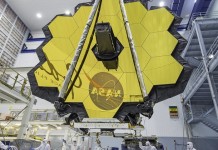Amazon: In the fourth quarter of 2022, Project Kuiper, which involves launching 3,236 Amazon internet satellites into low Earth orbit, will literally take off. In a statement posted on the delivery giant’s blog on October 1, the company announced that it had entered the US Federal Communications Commission (FCC) with a request for a license to launch, deploy and operate two satellites: the KuiperSat-1 and the KuiperSat-2.
The launch of these two prototypes constitutes an important step in the process of developing Amazon’s satellite constellation. Through them, it will be possible to test the communication and network technology that will be used in the final project. Performing real tests in Earth orbit will serve to validate the operations so far studied only in simulations and laboratories.
According to Project Kuiper’s vice president of technology, Rajeev Badyal, several technologies were invented to meet cost and performance targets to deliver broadband connectivity to 95% of the world’s population. “We hope to learn a lot, given the complexity and risk of operating in such a challenging environment,” said the executive in the press release.
How will Project Kuiper work?
Similar to SpaceX’s Starlink, Project Kuiper plans to install a constellation of low-earth orbit satellites. The goal is to provide “fast and affordable broadband to underserved and underserved communities around the world,” says Amazon. The company took advantage of Monday’s release to announce its partnership with mobile operator Verizon, which will provide its expertise in telecommunications.
In addition to Verizon, Amazon also announced an agreement with startup ABL Space Systems, a maker of space vehicle launch equipment. The Californian company will be responsible for conducting and installing the satellites through the brand new RS1 rocket, which is scheduled to take off from the Cape Canaveral Space Force Station, in Florida.
Due to their mobility, as they are built in shipping containers, ABL’s RS1 and GSO systems are considered ideal for the initial stages of the Kuiper Project, as they offer speed and flexibility. According to Amazon, working together with ABL over several months resulted in two integration design reviews.
Bezos vs. Musk
An approval of Project Kuiper’s first two satellites will certainly add fuel to the bonfire of vanities that fuels the rivalry between Amazon founder Jeff Bezos and Space X founder and CEO Elon Musk. The two space companies are vying for NASA and Pentagon launch contracts and have recently been embroiled in a court battle over a hefty contract to build a NASA lunar spacecraft.
Earlier this year, SpaceX asked the FCC to approve a plan to reduce the altitude of its satellites, but Amazon blocked the approval, claiming that this would directly interfere with its plans to remove elements from its constellation in case of defects in orbit.
Musk immediately rushed to Twitter and accused Amazon of unfair competition. Amazon countered, saying that SpaceX breaks the rules that other companies are required to comply with.



